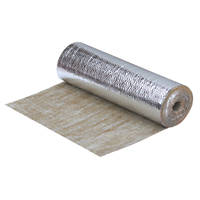We’d like to remind Forumites to please avoid political debate on the Forum.
This is to keep it a safe and useful space for MoneySaving discussions. Threads that are – or become – political in nature may be removed in line with the Forum’s rules. Thank you for your understanding.
📨 Have you signed up to the Forum's new Email Digest yet? Get a selection of trending threads sent straight to your inbox daily, weekly or monthly!
Calling any Solid Wood Flooring Installation Experts - Order of laying
sho_me_da_money
Posts: 1,679 Forumite





Hi Community.
I am thinking of getting my living room floor (presently Carpet) replaced with Solid Wood Flooring in Herringbone (20mm thickness).
Current state is that under the carpet is insulation and under that are the old school floorboards. Can someone advise if the following order is correct:
- Remove carpet and old insulation
- Fix any snags with the original wooden floorboards (popped up nails, uneven surfaces etc.)
- Lay down a vapour barrier membrane
- Lay plywood down to give it the 100% flat surface
- Install insulation
- Install solid wood
This order my wrong OR there may be things that are overkill here. I have just done some basic googling to how subfloors for solid wood are prepped and put up the full list. I would be grateful for anyone that knows this area to provide any feedback.
Many thanks
I am thinking of getting my living room floor (presently Carpet) replaced with Solid Wood Flooring in Herringbone (20mm thickness).
Current state is that under the carpet is insulation and under that are the old school floorboards. Can someone advise if the following order is correct:
- Remove carpet and old insulation
- Fix any snags with the original wooden floorboards (popped up nails, uneven surfaces etc.)
- Lay down a vapour barrier membrane
- Lay plywood down to give it the 100% flat surface
- Install insulation
- Install solid wood
This order my wrong OR there may be things that are overkill here. I have just done some basic googling to how subfloors for solid wood are prepped and put up the full list. I would be grateful for anyone that knows this area to provide any feedback.
Many thanks
0
Comments
-
-
If you "snagged" the original floorboards and used an appropriate underlay for a flooring you don't need to lay plywood down too, unless you're gluing down the flooring?
0 -
That’s would the perfectionist way to do it. Staple it or glue it to the plywood for the most solid feeling underfoot.0
-
I've been told that laying down a vapour membrane is an absolute must to avoid moisture and cupping.
Im not sure if that goes directly on the original floorboards followed by plywood or does an insulating layer go down after the membrane and before the plywood.
Not sure how solid floor is installed. FYI this is NOT engineered wood flooring.0 -
Surely this is the first thing you should be looking at. TBH, if you're going to get a solid wood, herringbone floor fitted then I'd probably get it done professionally.sho_me_da_money said:I've been told that laying down a vapour membrane is an absolute must to avoid moisture and cupping.
Im not sure if that goes directly on the original floorboards followed by plywood or does an insulating layer go down after the membrane and before the plywood.
Not sure how solid floor is installed. FYI this is NOT engineered wood flooring.0 -
If you want to insulate your suspended floor you would typically lay insulation between the joists, from below if you have access or from above by removing your old floor boards. The moisture/ vapour barrier can go down now if your are laying plywood sheet down over the joists or if floor thickness is not an issue then on top of your old floor boards after you reinstall them and the the plywood on top. Best practice would be to use structural/external grade plywood sheets, but it cost more.0
-
Thanks for this. So in summaryTyphoon2000 said:If you want to insulate your suspended floor you would typically lay insulation between the joists, from below if you have access or from above by removing your old floor boards. The moisture/ vapour barrier can go down now if your are laying plywood sheet down over the joists or if floor thickness is not an issue then on top of your old floor boards after you reinstall them and the the plywood on top. Best practice would be to use structural/external grade plywood sheets, but it cost more.
Option 1- Remove old carpet
- Remove old insulation
- Remove floorboards
- Insulate between the joists
- Lay the vapour barrier on top of the joists
- Install plywood over the joists and vapour barrier
- Install solid wood over the plywood
- Remove old carpet
- Remove old insulation
- Lay the vapour barrier on top of the floorboards (ensuring any obvious floorboard snags are taken care of)
- Install plywood over the floorboards
- Install solid wood over the plywood
To be honest, I will likely get a professional installer in for this but knowledge is power and I like to know the basics before I appoint someone as I do not want to get fobbed off by them 'cutting corners' as I have experienced this year already.
I have also read that the new solid wood should be acclimatized for about 7 days. Seems pretty straight forward. The part that threw me off was when installing the floor you need to leave a gap away from the perimeter wall. Why?
In case it wasn't obvious from an earlier post, I have all skirting boards ripped off. The idea is to install them after the floor is down to get that neat finish.
0 -
Wood will expand and contract depending on humidity so it is best to leave an expansion gap. Yes even if secret nailed or glued down.The skirting board should more than cover the gap. Usually the manufacture will state how much of a gap to leave. If you have the heating on in the winter it should not really change too much unless you have a very big room. Still good practice to leave an expansion gap. Yes let the wood acclimatise to the humidity in the room before laying.0
-
Thanks for taking the time to respond.Typhoon2000 said:Wood will expand and contract depending on humidity so it is best to leave an expansion gap. Yes even if secret nailed or glued down.The skirting board should more than cover the gap. Usually the manufacture will state how much of a gap to leave. If you have the heating on in the winter it should not really change too much unless you have a very big room. Still good practice to leave an expansion gap. Yes let the wood acclimatise to the humidity in the room before laying.
At this moment, im likely going to follow the steps for Option 2.
Had a question about acclimation. Here's a link to the exact video/time I was using as a reference to follow (50 seconds in) - https://youtu.be/xbrHZuwd12A?t=50.
https://youtu.be/xbrHZuwd12A?t=50.
I can see how one would 'stick and stack' long planks and leave for a few days to acclimate but how would I do this for Herringbone? Should I Stick and stack in groups or simply lay all pieces out randomly on the floor flat? Sorry for the basic question but would rather know than not.0
Confirm your email address to Create Threads and Reply

Categories
- All Categories
- 351.7K Banking & Borrowing
- 253.4K Reduce Debt & Boost Income
- 454K Spending & Discounts
- 244.7K Work, Benefits & Business
- 600.1K Mortgages, Homes & Bills
- 177.3K Life & Family
- 258.4K Travel & Transport
- 1.5M Hobbies & Leisure
- 16.2K Discuss & Feedback
- 37.6K Read-Only Boards


